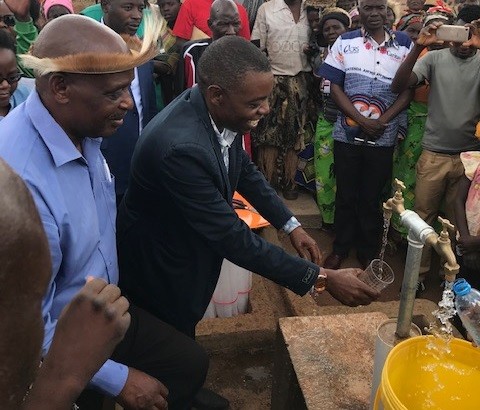Speeches Shim

Delivered by USAID/Zambia Food Security Specialist Harry Ngoma on behalf of USAID/Zambia Director Sheryl Stumbras
(Remarks as prepared)
Guest of Honor Provincial Minister, Mr Makebi Zulu, MP
Their Royal Highnesses: Senior Chief Nzamane, Chief Madzimawe, and Chief Mishoro
Bishop Catholic Diocese of Chipata George Lungu
The Permanent Secretary Dr. Bullet Nsemukila - Eastern Province
Mayor of Chipata Sinoya Mwale
The Council Chairman – Kasenengwa
The Districts Commissioners – Chipata and Kasenengwa
Other officials of the Government of the Republic of Zambia
Members of the community
Distinguished invited guests
Friends in the media
Invited Guests
Good morning. On behalf of the United States government, I am honored to be here with you today to celebrate the commissioning of the new water scheme to bring safe drinking water closer to Mishoro Village, and to acknowledge its status as an open defecation-free community.
We all understand that “water is life,” and therefore we strive for a world where all people have access to safe water and sanitation. Clean, affordable, accessible drinking water reduces a community’s vulnerability to waterborne diseases and supports the growth of our most precious resource - our children.
This is the reason the United States has committed to partnering with the Zambian government to improve the water supply and sanitation in Zambia.
Over the past 7 years, the U.S. government, through the Mawa project, contributed over $16 million dollars to provide Zambians in Eastern Province with clean, safe drinking water, sanitary latrine facilities, and improved food and economic security.
This is a top priority for the U.S. government and all water projects we undertake meet or exceed strict water quality standards.
USAID’s Mawa Project is constructing seven water schemes and digging 40 boreholes. An additional 40 existing boreholes will be rehabilitated and returned as active water locations for their communities.
While boreholes are very visable, let me take a moment to highlight the less visible aspects of this project. Sanitation and hygiene success is more than having access to safe facilities - it is about using these facilities. We must ensure that all the members of the community are educated on the importance of sanitation and environmental hygiene practices.
Achieving outdoor defecation-free status is not easy, and we applaud the work of all involved in these villages. To be honest, it can be extremely difficult to change someone’s daily routine and habits. Yet we know that a simple change such as washing our hands at critical times of the day -after using the toilet, before eating, and before feeding babies - significantly reduces all of our chances of getting sick. It sounds so easy, but it takes the commitment of each of us, and we can do it.
Adopting this one change in behavior will decrease the number of children suffering from diarrhea.
Under the Mishoro Chiefdom, I am very impressed to hear that 54 villages achieved outdoor defecation-free status. It is my genuine hope that you are able to maintain this status for the health of your children.
With this impressive start to driving your own improvements in water and sanitation, we are confident that local citizens, communities, and government will continue your partnership to ensure a healthy and productive future for generations to come.
On behalf of the American People, it is our honor to contribute to initiatives to improve water and sanitation in Zambia.
Related Speeches
- USAID and Egypt's Strategic Partnership: Proven Commitment, Growing Capacity, and Enhanced Private Sector Engagement
- Remarks by Veena Reddy, Acting Mission Director, USAID Cambodia, Launch for Capacity Building Partnership Fund, Phase III
- Remarks by Dr. John Collins, Education Team Lead, USAID Cambodia, Validation Workshop on Situation Analysis of Education Services for Children with Disabilities in Cambodia

Comment
Make a general inquiry or suggest an improvement.